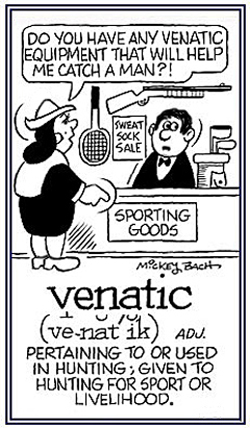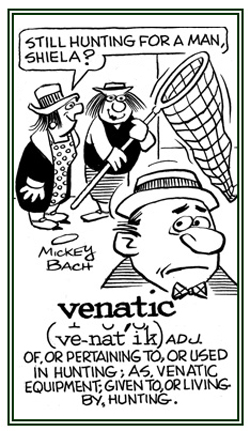venat-, vener-
(Latin: to hunt; hunting)
2. Descriptive of, or pertaining to hunting in ancient Roman times: The drawings on the wall in the temple depicted the venatic activities of Romans who were carrying spears and chasing wild animals.


Go to this Word A Day Revisited Index
so you can see more of Mickey Bach's cartoons.
2. A Roman gladiator: Sharon read in her history book that a venator was once an ancient Roman soldier who specialized in hunting wild animals, and was not only a professional combatant in Roman times.
2. Etymology: from venery, "practice or sport of hunting, the chase" from early 14th century; from Old French venerie, which came from Latin venari, "to hunt".
There are many group names from traditional terms of the hunt and some current creations that attempt to describe group characteristics.
Such historical nomenclature, or terminology, called Venereal Terms [listed at this page] or Terms of Venery, were said to refer to a gathering of "group names" or collective nouns from the hunt and social functions.
For more information about this segment, see Historical background for terms of Venery.
Venereal terms, or the language of the chase (hunt), were in general use as well-established hunting terms. The names were considered to be the proper terms for groups of beasts, fish, fowls, insects, or whatever was designated and they were "codified in the fifteenth century".
2. Etymology: from venery, "hunting" [archaic], "to hunt"; from Latin venari, "to hunt, to pursue"; the act, art, or sport of hunting; "love for the pursuit [hunt]".
Don't confuse this word with another venery which refers to "the pursuit of or indulgence in sexual pleasure".
2. The flesh of any edible game: The meat of any kind of wild animal that has been hunted, and not raised domestically, for example an antelope, can be termed venison.
3. Etymology: from French venaison which came from Latin venatio, venationis, "hunting", from venatus, venari, "hunt, to hunt".
Here is an attempt to clarify the different "hunt, hunting" and the "love, fondness" terms: vener-, "love, sexual references"; Names for Groups or "Venery names"; Introduction to Venereal and Other Group Terms or "Venery names"; Venereal Terms or "names for a variety of groups".
